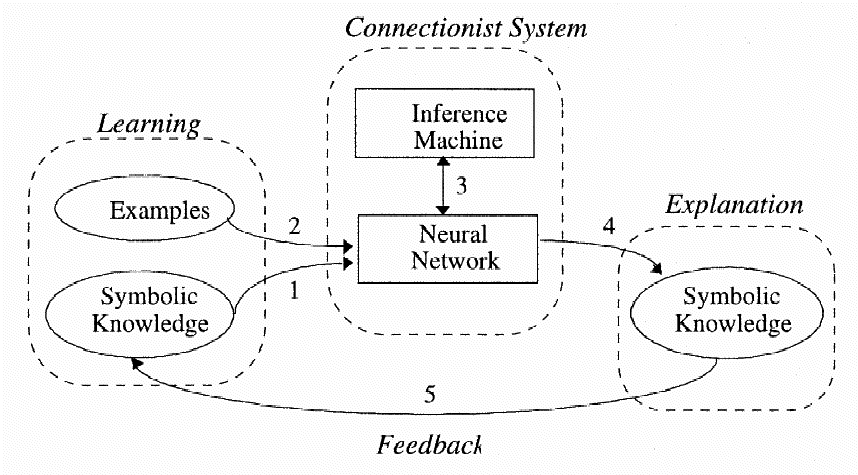| Marek Sergot | |
| Other academic members: | |
| Ian Hodkinson | |
| Krysia Broda | |
| Chris Hogger | |
| Francesca Toni | |
| Fariba Sadri | |
| Bob Kowalski | |
The Department has a long-established international reputation for pioneering developments in logic as a computational and representational formalism in artificial intelligence, databases, and software engineering. The research encompasses logic programming extensions, knowledge representation formalisms, automated reasoning, and the theory and applications of classical, non-classical and modal logics.

Neural-Symbolic Integration. From "Symbolic Knowledge Extraction from Trained Neural Networks: A New Approach", by A. S. d'Avila Garcez, K. Broda and D. Gabbay.
Several members of the group are working in the area of logic-based multi-agent systems, with particular emphasis on the development of abductive and constraint logic programming applied to planning, agent reactivity, and communication. There is also work on the creation and analysis of programs for teleo-reactive robots.
In databases, the main activity is in active and deductive databases, and temporal databases, applied in particular to the integration of heterogeneous and distributed information sources and the associated update and revision mechanisms. One important source of problems driving these developments is bioinformatics, where a number of projects are being undertaken in collaboration with the Department of Biochemistry, units of the School of Medicine, and the newly formed Institute for Genetics and Genomics, on the integration and automated update and curation of genomic and proteomic data sources and their interpretation.
There is substantial activity within the group on theoretical investigations in algebraic, modal and temporal logic, and related logical systems, on technical issues in applied multi-modal logics and their automation, particularly for logics associated with practical reasoning --- temporal, epistemic, deontic (obligation and permission), and action logics, and in finite and infinite model theory. Work on automated deduction includes Labelled Deductive Systems for non-classical logics, and tableaux methods.
Several members of the group have a long-standing interest in the role of computational logic for modelling patterns of agent interaction and the rules and policies governing such interactions, including human interactions, interactions between artificially intelligent agents, and human-computer interactions. Formal theories of argumentation are being investigated, both as a theoretical device in the formalisation of non-monotonic reasoning, and for application to practical problems, such as those arising in legal reasoning, and in conflict and dispute resolution in multi-agent systems.
Work continues on the representation of laws, regulations, rules, policies, technical standards, and codes of practice. Research on the logic of norms, action and agency is aiming to develop computational theories of the complex network of concepts such as right, duty, entitlement, responsibility, authorisation, authority, delegation. Applications are found in social aspects of multi-agent systems, e-commerce (e-business) and e-Government, and issues in computer security, particularly those concerned with authorisation policies and organisational aspects.